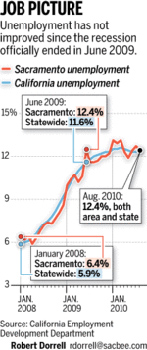
There - feel better now?
The recession was declared over Monday. It lasted 18 brutal months and ended in June 2009, according to the National Bureau of Economic Research, a private organization that tracks the U.S. business cycle.
If the economy's been in recovery the past 15 months, it's hard to find evidence of that in California. While the days of horrendous job losses have passed, the recovery has been so weak that unemployment has continued to rise since the reported end of the recession - to 12.4 percent statewide and in the Sacramento region.
"We're not even coming close to making up those (job) losses," said Dennis Meyers, an economist with the state Department of Finance.
Since December 2007, the official start of the recession, California has lost 1.3 million jobs. The toll includes nearly a quarter-million jobs that have disappeared since the recovery officially began.
If someone were measuring the economy just in California or Sacramento, it's possible they'd say the recession hadn't yet ended, said Jeff Michael, an economist at the University of the Pacific.
"We hit the trough, but we haven't come out of it," Michael said. The state's over-sized exposure to the real estate implosion is a key reason why business conditions remain so weak in California, he said.
In defining the beginning and end of recessions, the national bureau looks at a slew of economic figures beyond unemployment, including retail sales and industrial output. In its announcement, the bureau said it isn't arguing that "the economy has returned to operating at normal capacity."
At 18 months, this was the longest U.S. recession since World War II. It was two months longer than the downturns of 1973-75 and 1981-82.
The national unemployment rate of 9.6 percent is a tenth of a point higher than it was when the recession officially ended. Experts say the job market tends to lag in a recovery. Business conditions are improving, but employers usually wait until they're absolutely convinced it's OK to hire again.
Yet in this downturn, it seems employers are being even more careful than usual, said Michael Bernick, a former director of the state Employment Development Department.
Notably, the all-important construction sector in California continues to shrink. About 310,000 construction jobs have vanished since the recession began, including another 3,900 in August.
"Every month, we say it can't go lower, but it ... keeps getting lower," Bernick said.
At the EDD's job center on Broadway in Sacramento, news that the recession was over was greeted with a healthy dose of skepticism.
"Wonder who they're talking to?" said David Nelson, 28, of Sacramento, who lost his job working security at a bar three months ago. He said his job prospects are so bleak, he's thinking of going back to school.
"Everybody's going to get a job now," Lucious Rigsby said with a laugh. The 34-year-old Sacramentan lost his job a year and a half ago at a market-research firm.
"All I do is keep handing out résumés," he said. "I had to move out of my place and move in with my sister."
Nonetheless, experts say there are encouraging economic signs, both in California and across the country.
California's exports rose 21 percent in July compared with a year earlier, according to figures compiled by Beacon Economics consulting. Even though the state is facing a $19 billion budget deficit, and the budget is almost three months overdue, tax revenue is running slightly ahead of forecasts.
The stock market has rallied in the past couple of weeks as fears have tapered off about a double-dip recession, in which the economy goes into a relapse before it makes a full recovery.
Bernick, a labor lawyer in San Francisco and senior fellow at the Milken Institute, said he's hearing talk from employers that they're getting ready to expand.
"My sense is that business is slowly picking up," he said. "How much that will translate into hiring remains to be seen."
Yet troubling news continues to percolate. Last week alone, a small Sacramento manufacturer, Clarco Air Filtration Productions, said it will close in November and eliminate 51 jobs. Cache Creek Casino in Yolo County's Capay Valley halted a big expansion project that would have enlarged its casino and added a 2,200-seat events center.
Michael, the economist at UOP, said California's problems go beyond its sheer exposure to the housing bubble. Consumer debt, which ballooned during the housing boom, is weighing down the economy in a big way.
"That's making it especially difficult to sustain consumer spending in California," he said. Consumers account for about two-thirds of all economic activity.
He said another factor is the crisis in the public sector, which has led to layoffs at school districts, city and county governments and elsewhere.











